| Srl | Item |
| 1 |
ID:
069019
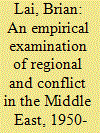

|
|
|
| 2 |
ID:
077439
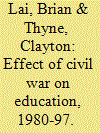

|
|
|
|
|
| Publication |
2007.
|
| Summary/Abstract |
This study examines the negative effects of civil wars and the post-civil war environment on educational expenditures and enrollment. Two causal mechanisms are considered. First, civil wars are likely to destroy a state's system of education through the loss of infrastructure and personnel. Second, a less deleterious cause may be the drawing away of funds for increased military expenditures to fight the civil war. Using UNESCO education data, the authors examine the percent change in educational expenditures and primary, secondary, and tertiary enrollment for all states from 1980 through 1997. The authors use a measure of when a state is in a civil war, a dynamic post-civil war measure, an interaction with military spending, and relevant control variables. The results indicate strong support for the notion that civil war is devastating for a system of education, as both expenditures and enrollment decline during periods of civil war. No support was found for the reallocation of education funds towards military spending during a civil war. These results highlight the importance of addressing the social costs of a civil war. Civil wars do not simply impose social costs because of increased funding to the military; rather, they severely disrupt a state's ability to provide even basic social services.
|
|
|
|
|
|
|
|
|
|
|
|
|
|
|
|
| 3 |
ID:
052177
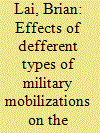

|
|
|
|
|
| Publication |
April 2004.
|
| Summary/Abstract |
One dominant explanation for why crises escalate to war is based on misperception. Alternative rational explanations for why crises escalate to war are examined, including commitment problems, the cost of revealing military advantages, and a desire for greater future gains. These explanations for war argue that states are likely to prefer a military to a diplomatic solution and to mobilizetheir militaries to maximize a surprise attack advantage. This type of mobilization (private) is different from mobilization by states seeking a diplomatic advantage (public) because states are trying to avoid revealing information. When one state in a crisis mobilizes privately, war is more likely because one state is committed to conflict whereas the other is not receiving signals of an impending conflict. The effect of private mobilization on war is tested using the International Crisis Behavior data. The results demonstrate that private mobilization is likely to lead to war.
|
|
|
|
|
|
|
|
|
|
|
|
|
|
|
|
| 4 |
ID:
074656
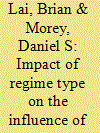

|
|
|
|
|
| Publication |
2006.
|
| Summary/Abstract |
Past studies of U.S. foreign aid and UN voting have not taken into account the different incentives of leaders based on regime type. Democratic and nondemocratic leaders use different means to remain in power, conditioning their response to foreign aid. Nondemocratic leaders can use foreign aid to provide private goods to elites ensuring continued support or to improve their coercive capabilities to maintain power. Democratic leaders can use neither of these tools, as their tenure requires mass support. This means nondemocracies are more likely than democracies to change their voting behavior in the UN to match donor preferences. Controlling for the influence of regime type allows us to test for when foreign aid is an effective tool of state policy. We find that nondemocratic state leaders respond to increased foreign aid by voting with the U.S. in the UN, whereas democratic leaders are nonresponsive to foreign aid.
|
|
|
|
|
|
|
|
|
|
|
|
|
|
|
|
| 5 |
ID:
061758
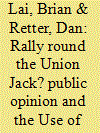

|
|
|
| 6 |
ID:
184189
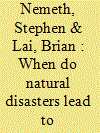

|
|
|
|
|
| Summary/Abstract |
The effect of natural disasters on the end of civil wars has received little attention from scholars. We argue that the effect of disasters on conflict negotiation is dependent on which combatant is victimized by disaster. Drawing on a bargaining model, we argue that disasters create costs that alter the capabilities of the rebels and government. In order for these changes to lead to negotiations, the effects of a disaster have to lead to the mutual expectation that military victory is unlikely in the short term. When both sides are hit by a natural disaster, this mutual expectation is likely to form because both sides face significant costs to engaging in conflict in the short term. When one side is impacted, the non-affected side is likely to see an opportunity to gain against its rival while the side facing the devastation of a natural disaster may see only a temporary setback that it can recover from. This may lead both sides to not update their beliefs about the costs of war, or their chances of victory. We evaluate these hypotheses by examining all territorial civil wars from 1980 to 2005 using a more precise measure of disaster location. We find that when both sides are hit by a disaster, the likelihood of negotiation consistently increases. When only one side is impacted, the effect on negotiations is not consistent across model specifications.
|
|
|
|
|
|
|
|
|
|
|
|
|
|
|
|